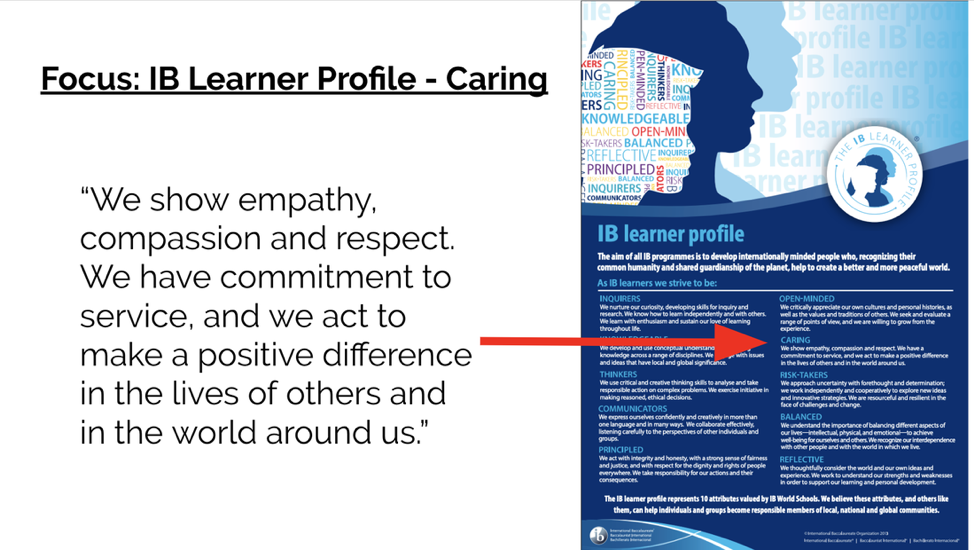February 14 is Valentine’s Day, a day to celebrate love, and February 17 is the Random Acts of Kindness Day. So, I have chosen to focus on the IB Learner Profile Trait that ties all of these things together: Caring. I am hoping that all of you recognize yourself in this trait:

We can associate the term caring with love, and Valentine’s Day has become the day to celebrate love. As a historian, I am often interested in the origins of such a tradition, so in doing some research, I discovered that Valentine’s Day has its beginnings as a pagan festival in ancient Rome, although it was in the Middle Ages that February 14 became associated with love. Over time, the date developed into the day we now see celebrated by exchanging valentine cards, and in some cases, chocolates and flowers. Here at LCC, candygrams are being sold so that you can send a candy and a card to your friends. Yes, it’s lovely that we set aside one day a year to celebrate love but think about it, there are 365 days in a year – 366 in a leap year, like this year. If we only celebrate love on one day out of all those days, what a waste of the other days! I would suggest that we celebrate caring every day of the year, with maybe just a bigger celebration on February 14. Think about what that could look like for you – daily acts of caring towards your family, your friends, your teachers, maybe even to people you don’t know personally, but who need empathy and respect too. That could be a lot of caring acts.
So, how could you do this? Many schools have a community service requirement for students. In the real world, or the world outside school, this requirement isn’t as common. However, many of your teachers engage in service not because we have to, but because we want to. For me, while I wasn’t required by my school, I still did it. I learned the importance of service from my parents, who were both involved in many community groups and activities. I may not have recognized it at the time, but my parents set a strong example for how to care for others besides yourself. They did this not simply by donating money to charitable organizations, but by giving of their time and skills. While it’s easy to pay a toonie on a Casual Dress Day, even if you don’t realize that the toonie goes to a charity of some sort, it’s a lot more challenging to give your time to help others. It’s also a lot more rewarding.
When my daughters were infants, I found out about an organization that worked with orphanages in China, started by a woman who had adopted a baby from China. This organization works with the staff at orphanages to make sure that the orphans are well taken care of. I began to donate money to the organization as a way of supporting them. I would often make a donation in the names of my children’s teachers. In fact, I still do that. The organization made it easy – they have a website where I can make a donation with my credit card. It takes only a few minutes of my time, and I feel good doing something to support what they do for orphans. It’s almost as easy as you paying a toonie for Casual Dress Day.
Then, I found a way to provide my time in service to this organization. They were looking for volunteers to help them with editing work for reports that they published regularly. On a regular basis, I would be sent pages and pages of reports to edit according to the guidelines the organization provided. It was not exciting work, but it felt worthwhile. I was providing a service that the organization would otherwise have to pay someone to do. Plus, I liked reading the reports about the children, especially knowing that what I was doing was in service to them.
The next time you pay a toonie on a Casual Dress Day, I challenge you to take a moment to think about the organization that it is going to support, and think about how you could support that organization or another one like it, with your time and effort – with your service.
There you have it – being caring, every day of the year, not just on February 14, can benefit you and the people to whom you show kindness. As this video shows, there’s science to prove it. Being of service to others can encourage more people to do this, and as we live the IB Learner Profile trait of Caring, we can make the world a better place for everyone, while bringing to life our school motto of Non Nobis Solum – not for ourselves alone.
Constance McGuire, Director of Academics
Works Cited
Dutton, Lenny. “Focus: IB Learner Profile – Caring.” Https://Www.excitededucator.com/Home/Small-Acts-of-Kindness, 3 Nov. 2019, www.excitededucator.com/home/small-acts-of-kindness.
“The Science of Kindness.” The Science of Kindness, 17 Nov. 2017, www.youtube.com/watch?v=O9UByLyOjBM&feature=youtu.be.
